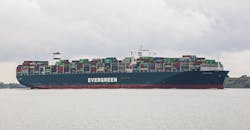The Suez Canal Ship Is Freed, But Headaches Will Linger for Months
The Evergreen Given, a massive containership operated by Evergreen Marine, ran aground and blocked all marine traffic on the Suez Canal for a week. Although the canal has been reopened, the knock-on effect of the blockage will affect every international shipper for months to come.
The Suez Canal connects the Mediterranean and Red Seas and provides the shortest sea link between Asia and Europe. The canal is also a key waterway for Asian goods shipping to the U.S. East Coast. In a normal day, 50 vessels carrying $3 billion dollars of goods transit the canal. The canal blockage delayed 400 vessels carrying billions of dollars of goods.
Knock-on Effects for Every Shipper
Here’s how every international shipper will be impacted by the blockage:
Vessel Delays. Either due to waiting in queue to enter the canal, or due to vessels being rerouted along the Cape of Good Hope around South Africa, impacted vessels will incur delays of 2-4 weeks in total.
Port Congestion at Destination. U.S. ports are already operating at capacity due to the combination of a surge in COVID-19 related cargo and manpower shortages on the docks. As delayed vessels arrive in large numbers outside of their slotted appointment times, ports will struggle to manage the flow. There will be dwell time waiting for a berth and vessel unloading and cargo availability will be slowed due to space constraints.
Schedule Reliability Deterioration. As vessels arrive in the U.S. and Europe late and then incur port congestion delays, the vessels will be late returning to Asia to pick up new shipments. This creates departure and arrival delays on the next voyage of every vessel.
Capacity Reduction. A single week’s sailing delay pulls a week’s capacity out of the shipping market at a time of full ships. In addition, to get ships back on schedule, the carriers will have to proactively cancel sailings, pulling out more capacity. One major carrier, Maersk Lines, already announced it is not accepting spot market bookings to and from Asia in order to ensure space for consistent shippers.
Equipment shortages in Asia. Vessel delays result in empty containers not being returned to origin to be filled with new cargo.
Pricing. The increased stress on the transportation market will push ocean rates higher.
What should be done for new shipments?
For new bookings, push your shipping schedule out weeks in advance and share the plan and your needs with your carriers. Prioritize the most urgent shipments. Other options that can be helpful in combating ocean delays and equipment shortages are:
- Discharging U.S. cargo at the first port of arrival and transloading it into a truck for onforwarding.
- Shipping at least some cargo from Asia to Europe via rail.
- Using one of the “fast ocean” services out of China, Hong Kong and Vietnam to the U.S.
- Using a sea/air combination service
- Converting ocean shipments to air
ICAO estimates that global air domestic capacity has been reduced by 50% and international capacity cut by 74%. Full recovery isn’t foreseen before 2023. So, there’s limited air capacity and air freight rates are very high.
What’s next for Ever Given shippers?
If your company has cargo on board the Ever Given, you’ll face a significant delay in getting it released. Because of the likelihood of substantial claims, the vessel owner declared General Average last week. General Average is a complex mechanism used to calculate the financial contribution required of a shipper to extraordinary expenses incurred on a voyage.
If you have cargo on board the Ever Given, maintain close communication with Evergreen, your freight forwarder and your cargo insurer. You’ll also want to analyze the impacted shipments and determine whether a replacement order is appropriate.
Time to Rethink Supply Chain Strategy
Given the global nature of business, there’s always a new disruption around the corner.
Unanticipated events such as the Suez Canal blockage are a further reminder to frequently review your supply chain and update it to minimize your company’s risk.
If your supply chain is far flung and based on Just in Time principles, review safety stock levels to ensure that they are sufficient for today’s market. Diversify sourcing locations, suppliers, transportation providers and shipping points. Consider insourcing critical item production or processing. Make smart sourcing choices by ensuring that a dollar value for risk is included in all cost comparisons.
To thrive in today’s less predictable world, both tactical and strategic supply chain changes may be necessary.
Lauren Pittelli is the founder and Principal of Baker Logistics Consulting Services, Inc., a consulting firm focused on addressing transportation, trade and customs consulting needs. Prior to starting Baker, she spent 30 years in senior leadership roles in the freight forwarding and customs brokerage industry, providing transportation, customs and contract logistics services to shippers. A graduate of Harvard College, she is also a licensed U.S. Customs House Broker.